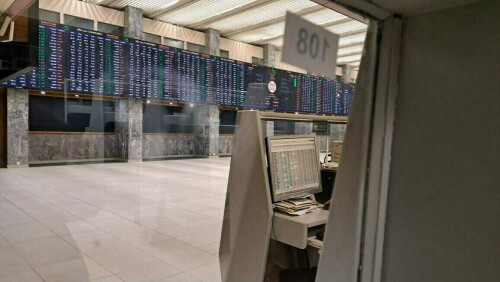Bearish Trend Grips Pakistan Stock Exchange
Following a promising start, the Pakistan Stock Exchange (PSX) encountered a wave of selling pressure, causing the KSE-100 Index to plummet by over 1,350 points during the day’s trading session on Monday.
As of 3:20pm, the benchmark index stood at 114,114.18, reflecting a decrease of 1355.16 points, equivalent to a 1.17% drop compared to the previous day’s closing figure.
Earlier in the day, the KSE-100 had exhibited positive momentum, fueled by robust buying activity. By 10:15am, the index had risen to 116,583.23, marking an increase of 1,113.89 points or 0.96% relative to the prior close.
On the preceding Friday, the benchmark index concluded trading at 115,469.35.
Heightened tensions between Pakistan and India, stemming from the Pahalgam incident, sustained pressure on the stock market, resulting in a 1.57% decline in the KSE-100 over the past week.
Analysis of Market Factors
According to a report released last week, the decline can be attributed to cross-border tensions with India and the futures rollover week. Further developments during the week included an agreement between Pakistan and two foreign commercial banks for a $1 billion loan at an interest rate of approximately 7.6%. Additionally, the government’s decision to raise debt from the domestic capital market through the issuance of Pakistan’s first sustainable investment asset-backed Sukuk bonds for funding three clean energy projects, requiring an additional Rs52 billion for completion, also influenced the market.
Geopolitical Context
Relations between Pakistan and India have deteriorated to a nadir in recent years, with New Delhi accusing Islamabad of backing cross-border terrorism following a major attack on civilians in the contested Muslim-majority region of Indian Illegally Occupied Jammu and Kashmir (IIOJK). Pakistan has refuted these accusations.
The two nuclear-armed rivals have implemented a series of retaliatory measures, including India’s suspension of a vital river water-sharing treaty and Pakistan’s closure of its airspace to Indian airlines.
Global Market Overview
Asian equity markets and the US dollar commenced the week cautiously amidst persistent uncertainty surrounding US trade policy, coinciding with a week abundant in significant economic data releases and major technology earnings announcements.
Despite claims of progress in trade negotiations with China and other nations by US President Donald Trump, concrete evidence remains scarce. Treasury Secretary Scott Bessent refrained from corroborating Trump’s assertion regarding ongoing tariff discussions with China on Sunday.
Christian Keller, Head of Economics Research at Barclays, noted that the uncertainty itself is as detrimental as the tariffs, adversely affecting the US economy as much as the rest of the world.
He cautioned that even if the ongoing earnings season showcases robust figures, numerous companies are likely to prepare for a downturn until visibility improves, thereby increasing the likelihood of a recession.
Early market activity was subdued, with MSCI’s broadest index of Asia-Pacific shares outside Japan experiencing a marginal increase of 0.1%. Japan’s Nikkei advanced by 0.9%, while South Korea strengthened by 0.2%.
This is an intra-day report.



Comments (0)
No comments yet. Be the first to comment!
Leave a Comment